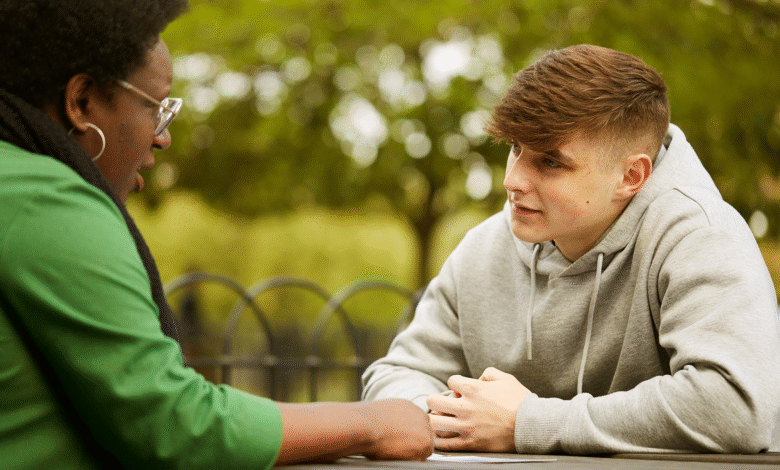What an Online Counsellor Can Do That Your Friends Can’t

“It’s okay, just stay positive.”
“Have you tried yoga?”
“Don’t overthink—it’s all in your head.”
Sound familiar?
For many Indians, friends and family are the default support system. And while their intentions are often good, their advice can fall short—or even make things worse. That’s where working with an online counsellor can radically change your mental health journey.
This blog breaks down exactly what professional counselling offers that even the most well-meaning loved ones cannot.
1. Friends Offer Comfort. Counsellors Offer Clarity.
Your best friend might be great at listening. But what happens when your story gets too complex? Or when your pain is met with silence, confusion, or discomfort?
A trained online counsellor knows how to listen with intent. They’re not just hearing you—they’re helping you explore patterns, hidden triggers, and emotional roadblocks. They guide without judgment. Challenge without shaming. And most importantly, they help you get unstuck.
“I kept venting to my roommate about my breakup for months,” says Aarav, 29, from Delhi. “But I was still stuck in the same spiral. It wasn’t until I spoke to a counsellor that I realized I had deeper self-worth issues playing out.”
2. A Counsellor Doesn’t Take Sides—They Help You See All Sides
Unlike friends, who may side with you to protect your feelings or validate your version of events, a professional brings objectivity.
When you’re in a mental fog, this neutrality can be powerful.
Consider situations like:
- Recurring relationship fights
- Workplace resentment
- Emotional flashbacks you don’t understand
- Feeling betrayed without clear reasons
An online counsellor helps untangle what’s really happening—internally and externally—without blaming anyone, including you.
3. Online Counselling Is Not “Just Talking”
One of the biggest myths is: “Why pay to talk when I can talk to a friend for free?”
But counselling involves structured techniques based on psychology and neuroscience. For example:
- CBT to reframe unhelpful thoughts
- Mindfulness to regulate panic
- Trauma-informed therapy for past abuse
- Inner child work to resolve abandonment issues
You’re not just talking. You’re being guided toward emotional regulation, insight, and healing.
And the best part? You can do it from home, at your own pace, with complete privacy.
4. Delhi’s Professionals Are Leading This Quiet Mental Health Revolution
In cities like Delhi, therapy is no longer taboo. In fact, the demand for the Top 10 Psychologists in Delhi has doubled in the past 3 years, according to Click2Pro platform data.
These professionals work with:
- College students facing academic burnout
- Couples navigating power struggles
- Young adults with identity confusion
- Executives battling imposter syndrome
- Individuals with clinical conditions like depression or OCD
What makes them special? They blend global clinical training with cultural understanding of Indian family dynamics, expectations, and societal norms.
You’re not getting one-size-fits-all therapy. You’re getting therapy that fits you.
5. When Your Inner Voice Turns Toxic, Friends Might Miss the Red Flags
Imagine telling your friends, “I feel like a failure.”
They may say, “Don’t say that—you’re amazing!”
Sounds supportive, right?
But if you genuinely believe you’re worthless, surface-level positivity won’t help. It may actually feel invalidating.
This is where professional red-flag detection matters.
Your counsellor may hear subtle cues and recognize signs of deeper distress—such as delusional thinking or trauma-based distortions of reality.
Mental health professionals are trained to:
- Identify warning signs early
- Differentiate between sadness and clinical depression
- Understand the difference between quirky beliefs and delusions
- Refer you to psychiatrists if medication is needed
- Help you separate your thoughts from facts
In contrast, a friend may unintentionally dismiss your pain or spiritualize it.
6. You’re Not a Burden in Therapy
Many people avoid sharing with loved ones out of guilt:
“They already have so much going on.”
“I don’t want to be the negative one.”
“They’ll think I’m being dramatic.”
With a counsellor, your emotional expression is not just allowed—it’s expected. Their entire role is to hold space for you, professionally and ethically.
And when that space is digital, private, and judgment-free? It can feel like a lifeline.
Final Word: Friends Are Great—But They’re Not Your Therapist
You deserve more than casual advice, recycled affirmations, or spiritual bypassing.
You deserve clinical guidance. Structured healing. A space where it’s safe to be messy, vulnerable, and confused.
Working with an online counsellor doesn’t mean your friends aren’t enough. It means you’re giving yourself more—more clarity, more tools, more chances to feel whole again.
So when things feel heavy, remember:
You don’t have to carry it alone.
And you don’t have to wait for a breakdown to begin.



